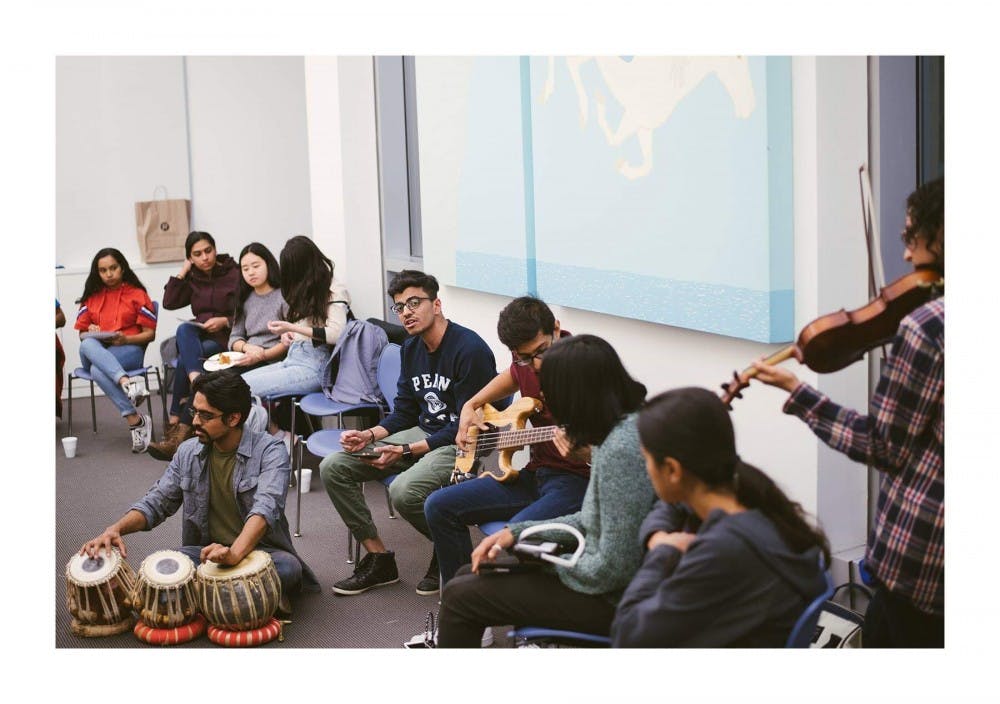Most musical groups at Penn restrict their music–making to rehearsals and the occasional gig or performance. Not Penn Sargam, one of America’s few college performing arts ensembles dedicated to South Asian fusion music. At their Open Jam and Chai Chat in collaboration with Penn Sangam last Thursday, Sargam expanded the discussion—and creation—to everyone.
While the two student groups differ in only a letter, their purposes are far from the same. The musical group Sargam performs a blend of Indian classical, Western classical, South Asian film, pop, and rock music. Utilizing vocals, Western instruments like the drums, guitar, violin, viola, saxophone, and keyboard, and Indian instruments like the sitar, harmonium, and tabla, Sargam has established themselves within a style altogether their own. On the other hand, Sangam is a discussion group encouraging conversations on “social, political, and cultural issues pertaining to the Pan–Asian community,” from interracial dating to Asian–American media representation. Their recent event with Sargam was a part of their monthly Chai Chat series, usually held in conjunction with other student groups.
As the members of Sargam and Sangam, as well as many other unaffiliated students just curious about the event, packed Harnwell M10 (indulging in hot samosas and some extremely well–made chai), one could feel everyone’s enthusiasm for hearing the perspectives of others. First on the docket was the discussion, where members of Sangam posed questions about the role music played in their lives, especially as it related to the Asian identity. In this free–flowing, open conversation, the fifty–person–strong group of attendees delved into topics like using cross–cultural influences in Western and Asian music (and the practice’s context in the cultural appropriation vs. appreciation debate), how music can connect someone to their heritage, the positives and negatives of “fusion music” as a concept, and more.
Particularly interesting was the dialogue on cross–cultural sampling—from Missy Elliott’s use of bhangra in “Get Your Freak On,” to Jay–Z’s remix of “Mundian To Bach Ke,” to Selena’s Indian influences in “Come & Get It,” to the increasing amount of Western influence in Bollywood and K–pop music, those present were generally appreciative of rising globalization in music and incorporating elements of different cultures into one’s own music, as long as it was done respectfully. Meerabelle Jesuthasan (C’ 19), President of Sargam, notes that it was interesting to see the interplay between Sangam, which consists mostly of second–generation Asian Americans, and Sargam, which has more first–generation members. She mentions that “...they had different perspectives on topics such as cultural appropriation, for example.”
Following the discussion, Sargam began their Open Jam—a music–making format they often conduct, and have previously publicized as official events for the public to partake in. Simply put, Open Jams are Sargam–led jam sessions where anyone can try their hand at any instrument, or join in singing a song. A method of artistic creation where everyone—whether or not they consider themselves a “musician” or are in a performing arts group—can participate, Meerabelle states that “...our [musical] process is very much centered around jams” and that open jams are “a really good way to learn and improve.” At Thursday’s jam, people gathered around Sargam members, playing or learning their way around instruments ranging from the guitar to the tabla. As the group played soulful, melodic chords and others sang melodies of everything from Maroon 5 to popular Bollywood songs over them, it was clear how Sargam’s unique concept had the potential to use music to truly unite people across cultural divisions.
Our progressively globalizing world has led to immigrant diasporas all over and far–reaching implications within the musical sphere. As Meerabelle explains, groups like Sargam are “a way of connecting with one’s South Asian side without feeling judgement.” She speaks on rising interest in this type of fusion music, describing that “although most bands at Penn tend to be based on Western music, at our last show in the spring, we sold out a pretty big space, including to non–Penn students.”
From the rising popularity of Latin trap in America, to Spotify’s new Global X playlist, music with influences from all around the world isn’t going away anytime soon. To get involved with Sargam and get notifications for their next Open Jam on December 1, follow their Facebook; to keep up with Sangam events, you can do the same.







